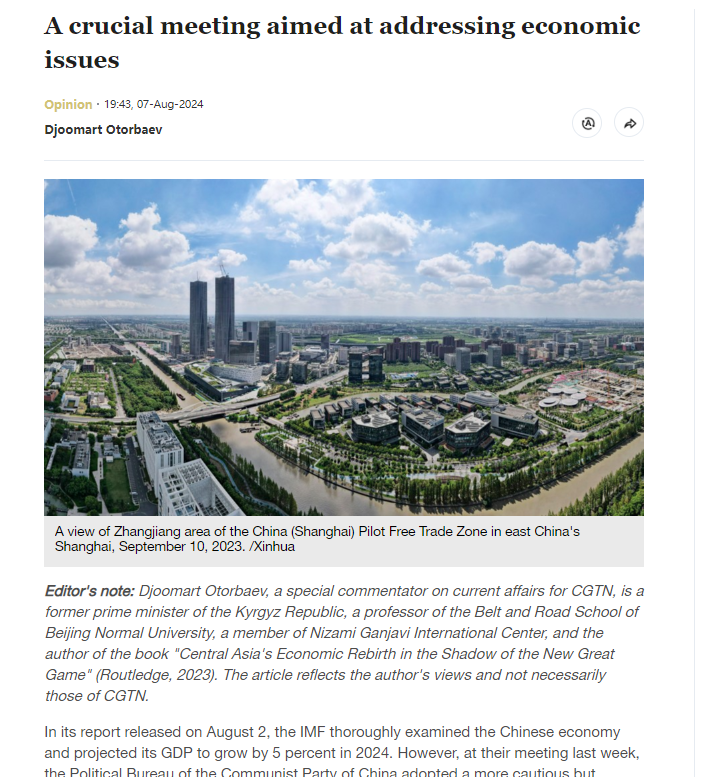LATEST INSIGHTS
Your Present Location: LATEST INSIGHTS[CGTN] Djoomart Otorbaev: A crucial meeting aimed at addressing economic issues
Source: CGTN Published: 2024-08-07

By Djoomart Otorbaev
In its report released on August 2, the IMF thoroughly examined the Chinese economy and projected its GDP to grow by 5 percent in 2024. However, at their meeting last week, the Political Bureau of the Communist Party of China adopted a more cautious but realistic stance. This prudent approach instills confidence in the government's measures to boost growth in the world's second-largest economy. Their acknowledgement of the need for essential reforms to address China's economic challenges has been well-received by investors and the business community.
The meeting, held shortly after the Party's third plenary session, detailed the short- and medium-term goals outlined during the plenary. The Political Bureau of CPC Central Committee's July 30 statement extended its support for reforms for the remainder of the year, which was more extensive than expected. The focus on bolstering the private sector and reestablishing investor confidence underscores the gravity of the economic situation.
The Political Bureau of CPC Central Committee, a pivotal entity in shaping China's economic policy, typically reviews the economic situation and policy yearly at its April, July and December meetings. The decisions made at the July meeting, which set the tone for policy for the second half of the year, are of utmost importance for achieving a 5 percent annual economic growth rate.
Currently, the national economy faces "growing negative pressure" from international markets and weak domestic demand. It grew by a lower-than-expected 4.7 percent year-on-year in the second quarter, following a 5.3 percent increase in the first three months. Decisions had to be made swiftly and extensively to rebalance an economy still heavily relying on construction and export manufacturing.
The Chinese government has long prioritized the development of industries using advanced technologies, such as electric vehicles and renewable energy. While this strategy has made the country a leader in many high-tech industries, "vicious competition" among local companies also caused prices to frequently drop below cost, leading to decreased profits and numerous business failures.
China's leaders have made a clear shift in this year's stimulus strategy, directing it towards consumers to meet the growth target. It marks a significant shift from the previous focus on investment in property and infrastructure. The latest report from the Political Bureau places more emphasis on household consumption than earlier reports. The official news agency Xinhua reported that "the meeting said domestic demand should be expanded with a focus on boosting consumption."
China's economic model, which relied too much on real estate and infrastructure investment for many years, has led to a large amount of debt over the past 15 years. Analysts caution that the current policy of increasing debt could lead to a prolonged period of low growth and the risk of deflation. The government will gradually shift resources from the public sector to households to address this imbalance.
The meeting's summary emphasized the need to build "new quality productive forces." The term refers to the priority of scientific research and technological improvements to drive reforms in one of the world's largest economies. It reaffirmed the country's commitment to accelerated modernization and high-quality development.
The authorities have reaffirmed their immediate commitment to supporting the private sector. They emphasized that the Party would "prevent and correct" the use of administrative and criminal measures to intervene in economic disputes. State-owned companies were mentioned less frequently, suggesting that most supportwill be directed towards private enterprises in the coming years. Special attention will be given to "gazelles and unicorns," which refers to new, fast-growing companies and high-tech start-ups. The statement cautioned against excessive "fierce competition" but also emphasized the need to strengthen mechanisms to ensure the "survival of the fittest" and eliminate "backward and inefficient production capacities."
The meeting also focused on the real estate sector, highlighting it as a critical area of concern. They stressed the need to accelerate the creation of the "new real estate development model" mentioned at the third plenary session. The Party is committed to combating the pressure in the housing sector by encouraging the purchase of affordable apartments and adjusting monetary policy to stimulate spending and investment.
The central government is committed to increasing its focus on macroeconomic policy and boosting market confidence to achieve its annual growth target. The planned actions are further complicated by the complex geopolitical environment, especially the uncertainty surrounding the upcoming U.S. elections in November and the aggressive anti-China statements made by presidential candidates. For instance, Republican candidate Donald Trump recently stated in a speech that he would impose a 60 percent tariff on Chinese imports if re-elected.
The estimates indicate that Washington's 10 percent tax increase could potentially reduce China's growth rate by 0.3 to 0.4 percentage points annually in 2025 and 2026, assuming other factors remain constant. This potential political change was thoroughly analyzed during the Political Bureau meeting. Implementing more decisive policies focused on domestic growth and fiscal expansion could help soften the impact of increasing external headwinds.
Beijing has pledged to strengthen counter-cyclical policies to boost economic growth in the year's second half. The Political Bureau of the CPC Central Committee clarified its intention to stimulate the economy. China's economy is indeed experiencing multiple stressors simultaneously, both cyclical and structural. However, examining the Political Bureau's decisions indicates that the government has "plenty of dry powder" and will achieve the targeted growth rates this year.























































































 京公网安备 11010802037854号
京公网安备 11010802037854号





